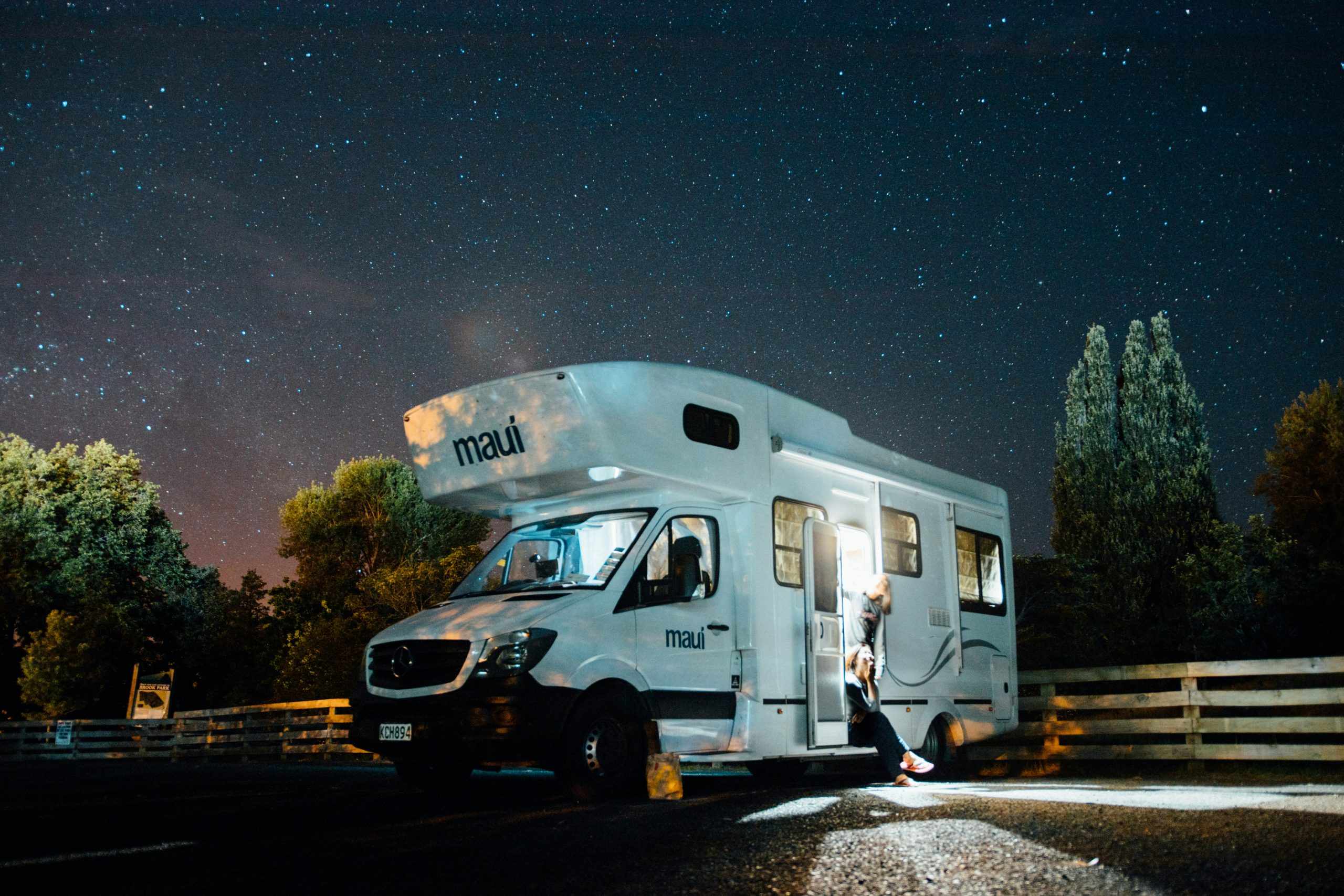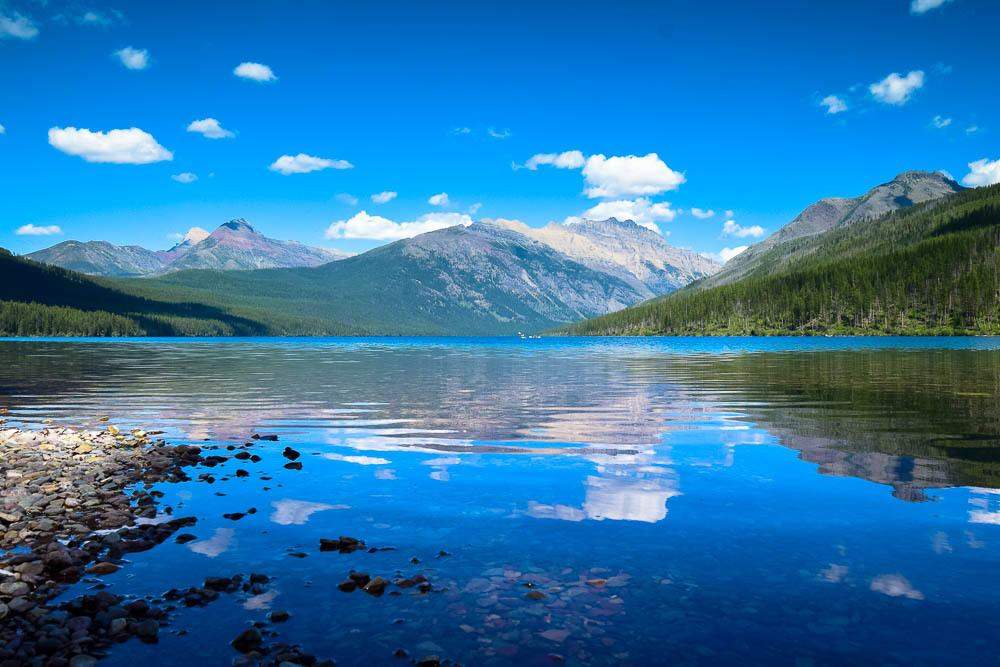Glacier National Park is all about alpine splendor. The park, located in northwest Montana, borders Waterton Lakes National Park in Alberta, Canada. Its remarkable terrain is formed by the movement of water and ice within the Rocky Mountains. This terrain gives rise to the beauty sandwich—that awe-inspiring landscape where blue skies and blue waters frame verdant green mountain slopes. Water, wind, and stone create scenes of splendor that are impossible to resist.
What to rent
Seeing as how the park is situated in the Rocky Mountains, there are lots of hills to climb and switchbacks to navigate. While the park can accommodate most RVs, we suggest renting either a travel trailer—so you can explore the park in the tow vehicle—or a smaller Class C or Class B motorhome. No matter which awesome RV you rent, I strongly suggest bringing along a good pair of binoculars and a camera as the park is full of amazing scenery and wildlife.
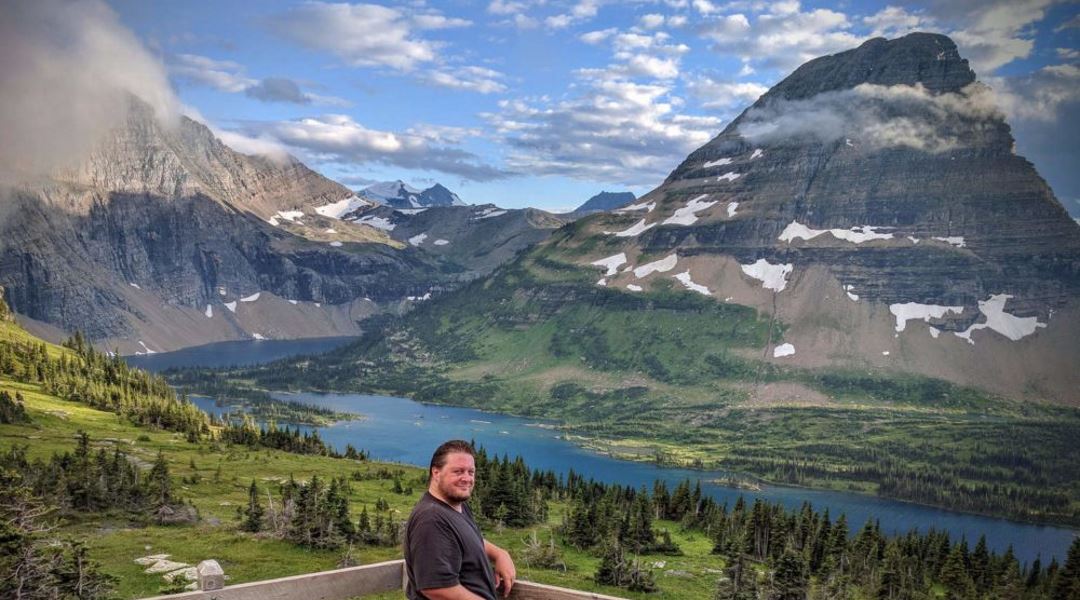 5 great things to see
5 great things to see
Like many of the great U.S. National Parks, you could spend many weeks exploring everything Glacier National Park has to offer. To make the park more approachable, we’ve mapped out five of the must-see attractions. And because many of them will take you on Going to the Sun Road—one of America’s most spectacular scenic drives—you get a bonus adventure without even trying.
Keep in mind that this alpine park gets a lot of snow in the winter and high summer and fall are the best times to go if you want to visit all areas of the park. That said, the park is beautiful in winter and there are many winter activities to enjoy.
Logan Pass to Hidden Lake
Logan Pass may be the most famous location in Glacier National Park. Situated at the high point on the Going to the Sun Road, Logan Pass is home to one of the larger visitor centers in the park. If you visit during peak season, be sure to arrive early or come just a few hours before nightfall or you may find yourself unable to secure parking. It’s a very popular spot and folks tend to stay awhile due to the length of the drive to get there.
There are a number of alpine trails you can hike from this point, all of them scenic and fantastic, but the hike to Hidden Lake is one of the most rewarding. First, you pass through the alpine garden just outside the visitors center before making your way up the slopes of the mountain on a well-built boardwalk. You are likely to see plenty of birds, ground squirrels and possibly some wooly marmots and—if you time your trip right and arrive in early summer—you’ll spot wildflowers everywhere.
If you have the legs for it, press on up the mountain until you get to Hidden Lake. Every step of the way is beautiful with waterfalls, alpine lakes, and bluebird skies. The trail stretches on for about 2.5 miles at a modest grade before ending at an overlook of Hidden Lake. Pro tip: This is a solid spot to snap a few photos. This is also a great trail to encounter mountain goats who forage on the high meadows during the summer and fall seasons. Stay here for the glorious sunset and then make your way back down to the parking lot. There, provided the skies are clear, stick around for the amazing night sky. The high altitude and dark skies make for fantastic stargazing.
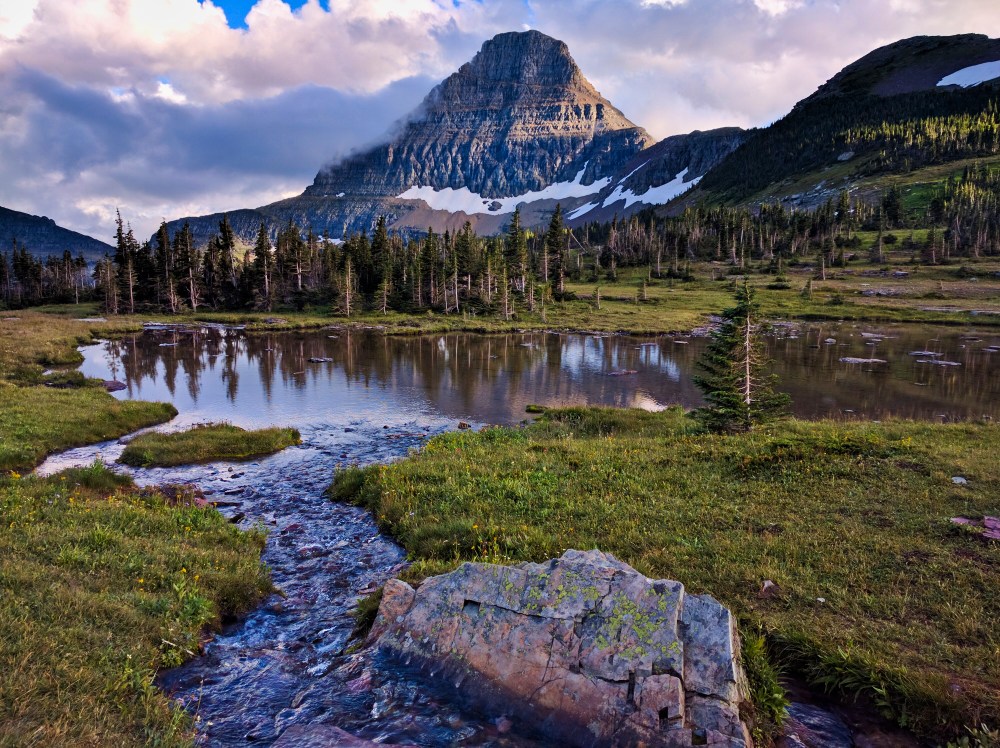
Two Medicine & Upper Two Medicine
Two Medicine is on the eastern side of the park and is more remote than many of Glacier’s other attractions. The location takes its name from the Blackfoot Indians who once made their homes among these sacred mountains. The Blackfoot considered it a sacred place—and it is. The still blue waters and striking peaks matched with the clean, crisp air bring about an inner peace that melts away anxiety and stress.
There are multiple options for exploring this landscape. You can hike the trails that skirt the lakes or wander up into the mountains. You can take the historic ferry that takes you to the other side of the lake or you can rent a canoe and explore the tranquil waters on your own. No matter where you go, there are plenty of discoveries to be had. The plant life is different on the east side of the park, and there is no shortage of wildlife—just be mindful as this is bear country, and its more remote than other parts of the park.
Consider taking one of the ranger-led walks or the ferry as guides are very likely to recount the fascinating history of Two Medicine, both from its early park years and the oral history of the Blackfoot.
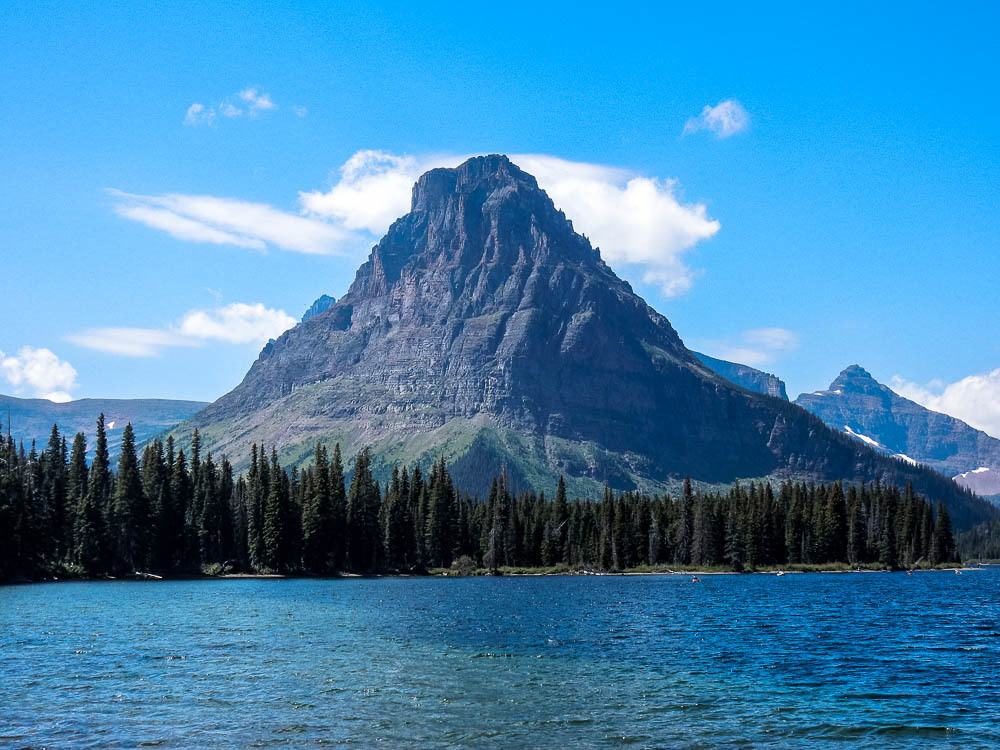
Upper Waterton Lake
If you visit Glacier National Park between June and September, you can go on a very cool international adventure. Glacier National Park in the U.S. and Waterton Lakes National Park in Canada are part of an international peace park. During the summer, you can take a cool ranger-guided hike that crosses the U.S.-Canada border and reflect upon the dichotomy of two nations and one natural landscape. Pro tip: bring along a passport for this trip just to make things easier.
The best way to do this hike is to drive up to the Waterton Townsite visitors center in Waterton Lakes National Park by taking the Chief Mountain International Highway on the eastern side of Glacier. From there, join one of the ranger-led hikes. You’ll want to head out very early in the morning as it is a long drive and a long hike. Pro tip: Contact the visitors center ahead of time to find out when the hikes will be taking place.
You’ll start out at upper Waterton Lake and make an 8.5-mile trek south. Along the way, you’ll traverse streams, waterfalls, lakeshore, forests, and all manner of gorgeous terrain. At the end of your journey, you can board a historic ferry and ride in comfort along the lake shore to return to where you started. Of course, if the hike sounds a bit much, you can always just take one of the Waterton ferries in both directions, enjoying some fine Canadian hospitality.
Swiftcurrent Lake to Grinnell Lake
The Many Glacier Hotel stands alongside Swiftcurrent Lake and provides luxury accommodations for travelers looking to savor the alpine beauty of Glacier National Park. A suite will run you more than $500 a night, so be glad you are enjoying the comfort and economy of your RV while still enjoying all the natural splendor the park has to offer. The terrain here is much like what you find at Two Medicine: a sublime mixture of alpine lakes, forested valleys, and rugged stone peaks.
There are many trails in the area, the most popular of which circles Swiftcurrent and Grinnell Lakes. These are wonderful trails for birdwatching as they feature both lake birds and ground birds, such as the spotted ptarmigan. In addition to the trails, you can head out on the lake itself by renting a boat or taking a guided tour. In the summer months, butterflies and caterpillars are abundant among the many mountain wildflowers that bloom here.
This is a great place to plan a day trip with a grand picnic or a post-hike supper at the hotel.
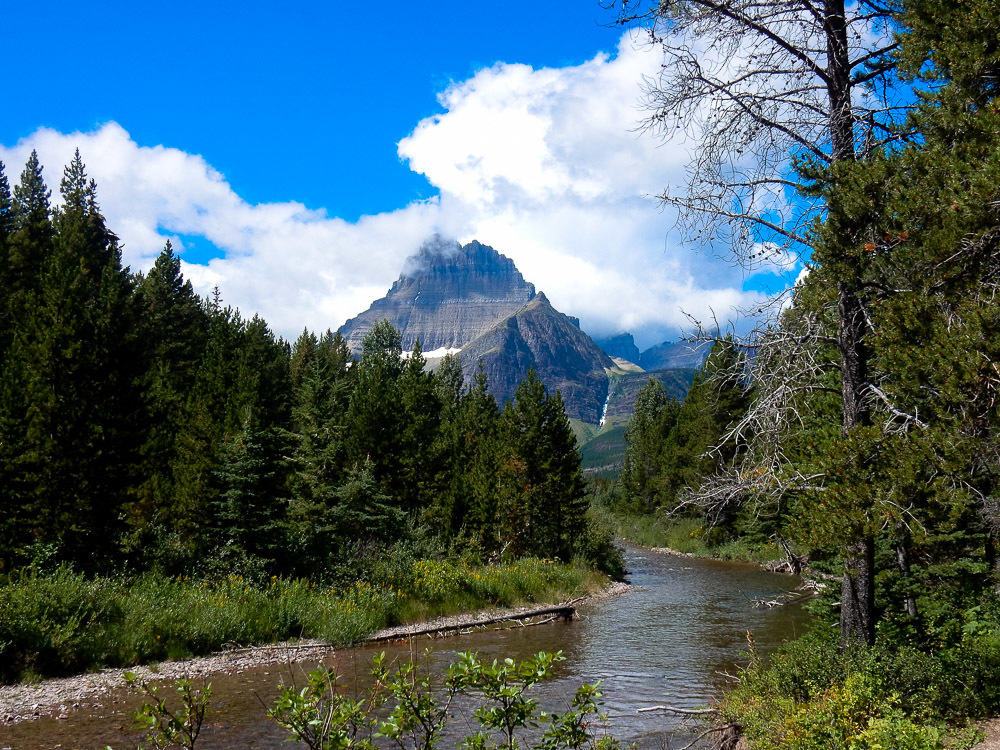
Kintla Lake
If you’re looking to get out to a place where you won’t find many of your fellow adventure seekers, but it’s not strictly backcountry, then consider taking a trip to Kintla Lake. Kintla and the better known Bowman Lake are both accessed by the North Fork Road into the park. While it starts out as a narrow paved road, to get to the lakes you’ll be traversing single-lane gravel roads. You will need a very small motorhome or a single vehicle if you want to head back here.
The reward is relative tranquility and serene beauty. Kintla Lake only has a handful of campsites, so you won’t find a lot of company here. The lake itself has some of the clearest waters you will ever find. (You can stare down into 20 feet of water and clearly see the bottom on a still day.) From an angle, the surface of the water looks like a polished mirror, reflecting the gorgeous landscape around you. If you can, bring a canoe or kayak. The experience of floating on Kintla Lake is like something like a dream. Row a bit away from the campground beach and find yourself in complete solitude amid the splendor of Glacier National Park.
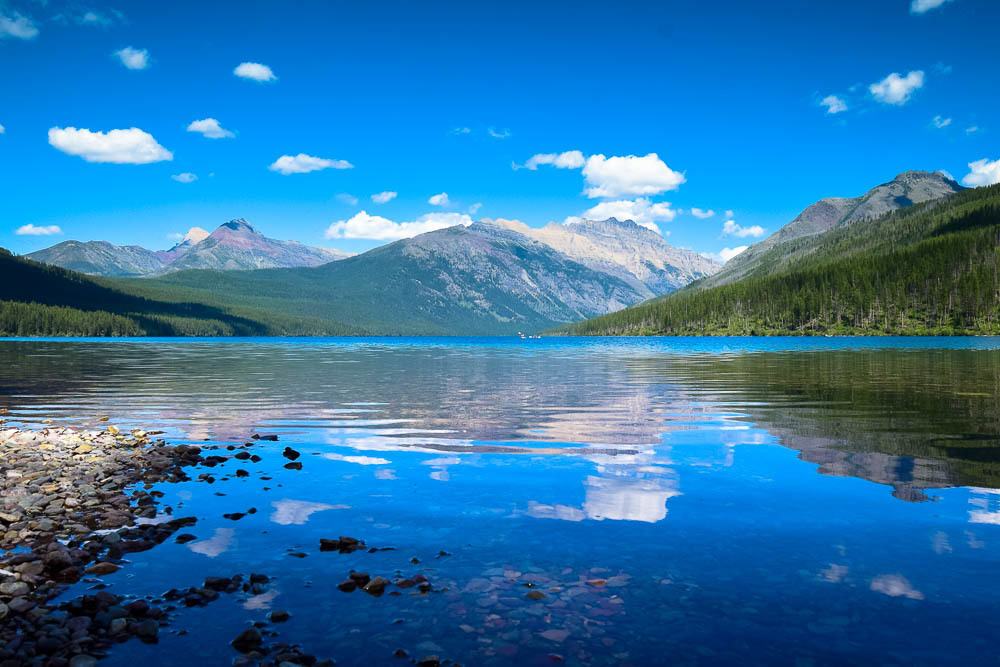
Ready for a big bite of this beauty sandwich? Search for a great RV on Outdoorsy and get started on your adventure in Glacier National Park.

